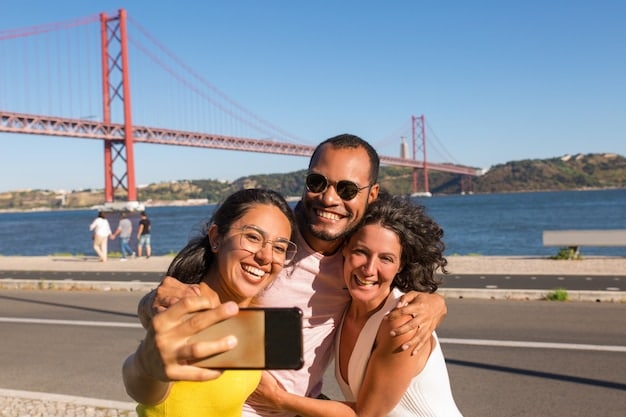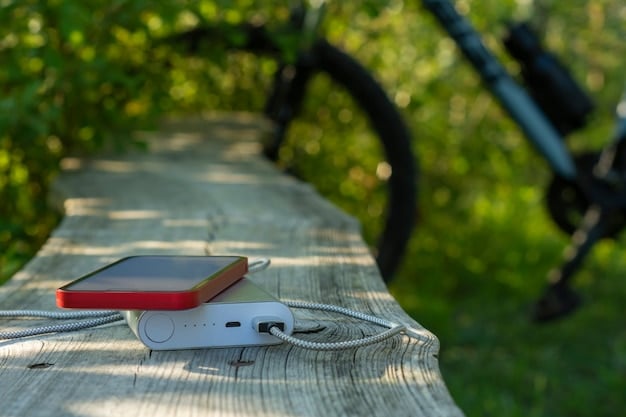Stay Safe While Traveling: 7 Essential Tips for US Travelers

Traveling in the US offers incredible experiences, but ensuring your safety is paramount; from being aware of your surroundings and securing your belongings to staying connected and informed, these seven essential tips will help US travelers stay safe and enjoy their journeys with peace of mind.
Traveling across the United States can be an incredibly rewarding experience, filled with diverse landscapes, vibrant cities, and unique cultural encounters. To fully enjoy your adventures, it’s essential to prioritize your well-being. This guide provides Stay Safe While Traveling: 7 Essential Safety Tips for US Travelers so you can relax and cherish every moment.
Stay Alert and Aware of Your Surroundings
One of the most fundamental safety measures is staying alert and aware of your surroundings. Whether you’re in a bustling city or a serene natural setting, vigilance can help you avoid potential dangers and enjoy your trip without unnecessary stress.
Pay Attention to Local Advice
Local sources often provide invaluable insights into safe and unsafe areas. Heeding their advice can help you steer clear of trouble and make informed decisions about your activities.
Trust Your Instincts
Whenever a situation feels uncomfortable, trust your gut feeling. It’s always better to err on the side of caution and move to a safer location if something feels off. Your intuition is often a reliable guide in unfamiliar environments.

- Avoid Distractions: Limit cell phone use or other distractions while walking in unfamiliar areas.
- Stay in Well-Lit Areas: Particularly at night, walk in well-lit areas to reduce your risk.
- Be Mindful of Crowds: Keep a close watch on your belongings and be aware of people around you in crowded places.
Staying alert and aware is not about living in fear, but rather taking proactive steps to protect yourself and ensure a smoother, more enjoyable travel experience. This simple vigilance can make a significant difference, allowing you to focus on the positive aspects of your journey.
Secure Your Belongings
Protecting your belongings is a key aspect of traveling safely. Theft can occur anywhere, so taking precautions to secure your valuables can prevent a significant disruption to your trip.
Use Anti-Theft Bags
Invest in anti-theft bags designed with features like slash-resistant materials and hidden compartments. These bags can deter thieves and provide peace of mind knowing your items are secure.
Keep Valuables Out of Sight
Avoid displaying expensive jewelry, watches, or electronics in public. Drawing unnecessary attention to yourself can make you a target for theft.
- Use Hotel Safes: Store important documents, extra cash, and valuable electronics in the hotel safe when you’re not using them.
- Carry Minimal Cash: Limit the amount of cash you carry and use credit or debit cards whenever possible.
- Be Cautious with Purses and Backpacks: Keep purses close to your body and backpacks in front of you in crowded areas.
Securing your belongings not only protects your valuables but also reduces stress and allows you to concentrate on the joys of your travel. By taking these simple steps, you can minimize the likelihood of theft and enjoy a more carefree adventure.
Plan Your Route and Share Your Itinerary
Effective planning can greatly enhance your safety while traveling. Knowing your route and activities ahead of time allows you to anticipate potential challenges and inform someone of your whereabouts.
Research Your Destinations
Before you travel, research your destinations to understand local customs, potential hazards, and safe areas. Informed travelers are better prepared to handle unexpected situations.
Use GPS and Offline Maps
Utilize GPS and download offline maps on your smartphone. This ensures you can always find your way, even without an internet connection.
- Share Your Itinerary: Inform a trusted friend or family member of your travel plans, including your route, accommodations, and activities.
- Set Up Check-Ins: Arrange regular check-ins with someone back home to confirm your safety and location.
- Be Flexible: While planning is important, be prepared to adjust your plans if necessary, based on safety concerns or unforeseen circumstances.
Planning your route and sharing your itinerary isn’t about micromanaging your trip. It’s about ensuring that you have a safety net in place and that someone knows where you are and what you’re doing. This preparedness can provide significant peace of mind, allowing you to embrace your journey with confidence.
Stay Connected and Charged
Maintaining connectivity is crucial for staying safe while traveling. A charged phone and access to communication can be lifesavers in emergencies.
Invest in a Portable Charger
Carry a portable charger to ensure your phone stays powered throughout the day, especially during long excursions or when access to outlets is limited.
Get a Local SIM Card
Consider purchasing a local SIM card for reliable and affordable access to call and data services. This is especially useful for international travel within the US.

- Utilize Wi-Fi Hotspots: Locate and use reliable Wi-Fi hotspots for communication and information access, but be cautious of unsecured networks.
- Know Emergency Numbers: Familiarize yourself with local emergency numbers (like 911) and how to contact local authorities.
- Download Essential Apps: Download apps for navigation, translation, and emergency assistance.
Staying connected isn’t just about convenience; it’s about ensuring you have the means to seek help, communicate with others, and access information that can keep you safe. A fully charged phone and a reliable connection can provide a sense of security and control, allowing you to navigate your travels with greater assurance.
Be Cautious with Transportation
Safe transportation is paramount when traveling. Whether you’re renting a car, using ride-sharing services, or taking public transit, exercising caution can significantly reduce your risk.
Inspect Rental Vehicles
Before driving a rental car, thoroughly inspect it for any mechanical issues or damage. Report any concerns to the rental company immediately.
Use Reputable Ride-Sharing Services
When using ride-sharing services, stick to reputable companies and verify the driver’s identity and the vehicle’s license plate before entering.
- Avoid Overcrowded Public Transit: Be cautious of overcrowded buses or trains, as they can be hotspots for petty theft.
- Use Designated Taxi Stands: In cities, use designated taxi stands to ensure you’re using licensed and regulated taxi services.
- Stay Sober: Avoid impaired driving or riding with an impaired driver.
Being cautious with transportation means actively taking steps to protect yourself from potential accidents, scams, and unsafe situations. This diligence allows you to move confidently from place to place, knowing you’ve taken responsible measures to ensure your well-being.
Trust Your Gut Feeling
One of the most reliable safety tools you possess is your intuition. Learning to trust and act on your gut feeling can often prevent you from getting into uncomfortable or dangerous situations.
Listen to Internal Alarms
If a situation feels off or a person gives you an uneasy vibe, don’t hesitate to remove yourself from the situation. Your subconscious often picks up on subtle cues that your conscious mind might miss.
Avoid Isolation
Try not to find yourself alone with someone you don’t trust or in an isolated place that makes you uncomfortable. Being near others provides an added layer of security.
- Don’t Be Afraid to Say No: If someone is pressuring you to do something you’re not comfortable with, confidently decline.
- Plan an Escape Route: In potentially risky situations, mentally identify an easy way to leave if necessary.
- Alert Others: If you feel threatened, don’t hesitate to alert others around you or call for help.
Trusting your gut isn’t about being paranoid but rather about recognizing and responding to your internal warning signals. Your intuition is a valuable resource that can help you navigate unfamiliar environments and make decisions that prioritize your safety.
Know Your Rights and Local Laws
Understanding your rights and local laws is crucial for navigating potential conflicts and ensuring fair treatment while traveling. Being informed empowers you to confidently handle interactions with authorities and protect yourself from unjust situations.
Research Local Laws
Before traveling to a new area, research local laws and regulations, particularly those related to public behavior, alcohol consumption, and interactions with law enforcement.
Understand Your Rights
Familiarize yourself with your rights as a traveler, including your rights during a police stop, your right to legal representation, and your rights regarding search and seizure.
- Keep Documentation Handy: Keep copies of important documents like your passport, visa, and driver’s license in a secure and accessible location.
- Know How to Contact Your Embassy/Consultant: If you’re traveling internationally within the US, know how to reach your embassy or consultant in case of emergencies.
- Stay Calm and Respectful: If you encounter a difficult situation with law enforcement, remain calm, respectful, and assert your rights without being confrontational.
Knowing your rights and local laws is a proactive step in ensuring your safety and well-being. This knowledge can empower you to handle conflicts confidently, protect yourself from unfair treatment, and navigate your travels with greater assurance.
| Key Point | Brief Description |
|---|---|
| 👀 Stay Aware | Pay attention to your surroundings to avoid potential dangers. |
| 🔒 Secure Belongings | Protect your valuables using anti-theft measures and hotel safes. |
| 📱 Stay Connected | Keep your phone charged and know local emergency numbers. |
| 🚕 Safe Transport | Use reputable services and inspect rental cars before use. |
FAQ: Traveling Safely in the US
▼
Report the loss immediately to the local police and the nearest embassy or consulate. Obtain a police report, which you’ll need to apply for a replacement passport, and follow their instructions for the next steps.
▼
Be wary of unsolicited offers or requests for money, and don’t provide personal information to strangers. Verify any offers with trustworthy sources, and avoid engaging in high-pressure situations.
▼
Know your health insurance coverage while traveling and locate nearby hospitals or clinics in advance. In case of an emergency, dial 911 and describe your location and the nature of the emergency clearly.
▼
Thoroughly inspect the car for any visible damage before driving. Check the tire pressure, fluid levels, and lights. Report any issues to the rental company immediately, and request a different vehicle if necessary.
▼
Public Wi-Fi networks are generally not secure. Avoid accessing sensitive data, such as banking information, on public Wi-Fi. Use a VPN (Virtual Private Network) to encrypt your connection if you must use public Wi-Fi.
Conclusion
By integrating these seven essential safety tips into your travel routine, US travelers can significantly enhance their safety and well-being on their adventures. Staying vigilant, planning ahead, and trusting your instincts will help ensure a smooth, enjoyable, and secure travel experience.





